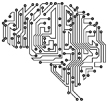by Joelle Steele

I’m a high IQ polymath. Don’t cringe! A polymath is merely someone who is an expert in many fields or disciplines. My IQ is 186, which puts me in the top one-tenth of a percentile (the 99.9th percentile). I used to belong to three high-IQ societies, so I have met a lot of other high-IQ people, and I have learned a lot about IQ and IQ testing, and about people with high IQs. Here’s what I’ve learned so far:
First, having a high IQ, even a super-high IQ like mine, does not make a person the least bit better than anyone else. The many high-IQ people I’ve met in Mensa (top two percent or 98th percentile), the International League of Intelligence (a.k.a. “Intertel”– top one percent or 99th percentile), and the International Society for Philosophical Enquiry (a.k.a. “The Thousand” – top one-tenth of a percent or 99.9th percentile) have proven to me, without a single doubt, that intellect has nothing to do with the quality of a person as a human being. High-IQ groups have just as many truly kind and loving members and out-and-out assholes as you would find in any other segment of the population of the world.
Second, IQ does not guarantee any form of success in life, even if you are exercising your “superior” intellect daily. IQ is merely a guideline used to measure knowledge and how you use it. That alone will not help you in this world. Hard work is far more likely to bring you success, in whatever form you conceive success to be.
Third, being a know-it-all and trying to prove you have all the answers all the time will not endear you to anyone. I learned this from doing all kinds of research as a writer and just through the studying I’ve done in various subjects. Studying and research are great as far as expanding your mind. But no matter how much I learn, all I ever know is how unbelievably little I know, and how I can never know everything.
We should avoid becoming so sure what we think is right that we condemn those who don’t think or believe what we do. I think we always have to remember that no matter what our IQ is, we only know what we know as of today. Tomorrow, a new discovery could be made that revolutionizes our knowledge and makes us think differently about everything. I think, in particular, that scientists need to put aside the self-righteous notions they so often have towards anything that they can’t immediately prove with empirical studies. It’s been only a little more than 50 years since we began proving a man was not a parent of a child by using blood types. But now, as of 1983, we can prove who the father is using DNA testing. Who knows what the future holds?
We have to keep learning, keep searching for the truth, and not assume we already have all the answers. The more you know, the greater the thirst for more knowledge, and knowledge changes with time. What you learned in high school, what you learned last week, what you think you know, is always subject to change. Learning is dynamic. It forms your opinions and ideas, and if you are always learning, your opinions and ideas will inevitably be modified or shift and change completely as the world changes around you and new information is discovered and becomes available.
You have to keep learning to keep current with the world. In many instances you’ll find out that you were wrong about something. And you should never be afraid to admit that you were wrong or to change your mind. It is only the ignorant who cling to their old, outdated opinions and ideas. The opinions of the educated and informed, regardless of their IQs points, will always be evolving over time, and they are the ones who will ultimately foster progress in their own lives as well as in the world at large.
